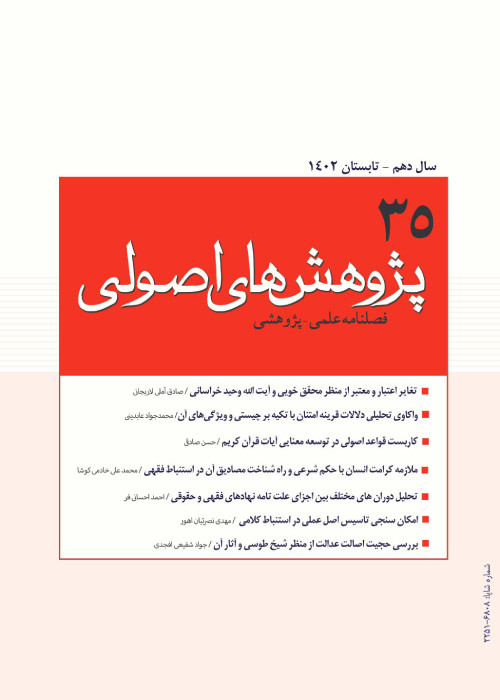فهرست مطالب
فصلنامه پژوهش های اصولی
پیاپی 13 (تابستان 1391)
- تاریخ انتشار: 1391/06/06
- تعداد عناوین: 5
- مقالات فارسی
-
صفحه 7
در کلمات دانشمندان اصولی استدلالهای متفاوتی به نفع نظریه امتناع واجب مشروط به چشم میخورد که هر یک از آنها در صدد است امتناع این سنخ از وجوب را در مرحلهای از مراحل حکم اثبات کند. برخی از این استدلالها وجوب مشروط را در مرحله اراده نفی میکنند، برخی در مرحله انشاء و برخی دیگر نیز در مرحله اثبات و ابراز.
شاید بتوان گفت مهمترین استدلالی که وجوب مشروط را در مرحله اثبات و ابراز، نفی میکند، استدلال اثباتی شیخ انصاری; است. بنابر این استدلال میتوان با تمسک به جزیی بودن مفاد هییت، استحاله تقیید در آن را که تعبیر دیگری از امتناع وجوب مشروط در مقام ابراز است اثبات کرد. اصولیان متاخر از شیخ انصاری دستکم شش اشکال متفاوت بر این استدلال وارد کردهاند. نوشتار حاضر از گذر نقد این اشکالات، به بررسی استدلال مزبور همت گماشته است.کلیدواژگان: شیخ انصاری، واجب مشروط، امتناع واجب مشروط، جزیی بودن مفاد هییت -
صفحه 47
بحث از مراتب حکم در علم اصول، به چگونگی شکلگیری حکم تا رسیدن آن به مکلف میپردازد. این بحث مورد اختلاف اصولیان واقع شده است. محقق خراسانی1 معتقد به مراحل چهارگانه برای حکم است. این مراحل عبارتند از: مرتبه اقتضاء، مرتبه انشاء، مرتبه فعلیت و مرتبه تنجز. این نوشتار ضمن تشریح این دیدگاه به برخی از نقدهایی که به آن شده می پردازد و سعی میکند تبیینی قابل دفاع از آن ارایه دهد.
کلیدواژگان: مراتب حکم، محقق خراسانی، مرتبه اقتضاء، مرتبه انشاء، مرتبه فعلیت و مرتبه تنجز - مقالات عربی
-
صفحه 75
هذه المقاله تتناول البحث عن المحورین التالیین:- القابلیات المتوفره فی مصدریه السنه الفعلیه للفقه السیاسی
- المحدودیات التی تواجه ها السنه الفعلیه فی مصدریتها للفقه السیاسی
وقبل بیان المحورین یجدر الإشاره إلی ان هذه القابلیات والمحدودیات لیست مما یوجد للاستفاده من السنه الفعلیه فی المجال السیاسی فقط، بل هما متوفرتان فی ای مجال فقهی، غیر ان المجال السیاسی یمتاز عن غیره بانه یمتلک هذه القابلیات او یواجه تلک المحدودیات بصوره جدیه اکثر، وهذا مما سیتضح من خلال البحث إنشاء الله تعالی.کلیدواژگان: السنه الفعلیه، الفقه السیاسی -
صفحه 99
هذه مقاله تبحث حول مساله واحده من مسایل علم الاصول و هی مساله الاوامر والنواهی الإرشادیه التی لها دور کبیر فی فهم معانی الاوامر و النواهی الوارده فی الکتاب و السنه لبیان الاحکام الشرعیه، شرحت هذه الوجیزه موارد الإرشاد و نمت عن قراینها، مشفوعه بذکر امثله منهما وتعرضت بنقل کلمات من الاعلام، وافیه لتوضیح المساله، شامله لجمیع جوانبها، تورث تنویر الاذهان و لقاح الافکار، ونهضت بدراسه مساله طالما وقعت مغفولا عنها فی اکثر الکتب الدراسیه و قلما توجهت إلیها انظار الفحول.
کلیدواژگان: الامر المولوی، النهی المولوی، الامر الإرشادی - احیا تراث
-
صفحه 117
-
Page 7
Usulians have different reasoning for demonstration of impossibility of conditioned obligatory which of them proof this type of obligation in one of the judgment’s stages. Some of these demonstrations negate conditioned obligatory in the stage of will, and some of them in the stage of creation, and others in the stage of demonstration. It seems the demonstrative reasoning of Sheikh Ansari is the most important reasoning that negates conditioned obligatory in the stage of demonstration. According to his reasoning it could be proof that the impossibility of conditioned obligatory by particularity of content of the form (hey’at). Recent usulians make at least six different difficulties to Sheikh Ansari’s reasoning. This article tries to explain this reasoning by criticizing those difficulties.
Keywords: Sheikh Ansari, conditioned obligatory, impossibility of conditioned obligatory -
Page 47
Discussion about stage of the judgment (hokm) refers to the topic how produce a judgment in order to reach to who charged with that judgment. The researcher Khorasani argued that the judgment (hokm) has four stages: the stage of Appropriateness (eqteza); the stage of Creation (ensha); the stage of Actuality (fea’liat); and the stage of Binding (tanjiz). Other usulians affirm or reject this idea. This article explains and clarifies the researcher Khorasani’s view and criticizes the most important views about this subject and try to present a reasonable interpretation of it.
Keywords: The researcher Khorasani, stage of the judgment (hokm), the stage of Appropriateness (eqteza), the stage of Creation (ensha), the stage of Actuality (fealiat), the stage of Binding (tanjiz) -
Page 75
This article argues about two subjects: many capacities in the Sunnah of actions (fea’li) to be sourcing for the political Feqh; and some restrictions of this type of Sunnah for sourcing in political Feqh. Indeed these capacities and limitations exist for using the Sunnah of actions (fea’li) in all Feqhi fields, but the political field in Feqh distinguishes from other era because it possesses more capacities for using the Sunnah of actions (fea’li). This essay amplifies this subject.
Keywords: the Sunnah of actions (feali), the political Feqh -
Page 99
This article discusses about the problem of guiding (Irshadi) imperatives (Awamer) and negative imperative (Nawahi). The role of this problem in specifying meaning of imperatives (Awamer) and negative imperative (Nawahi) in The Book (Qor’an) and Sunnah for understanding shar’ii laws (Ahkam) is very important. This essay explains all types of guidance (Irshad) with examples. In addition it states views of researchers and explicate this problem in detail.
Keywords: guiding (Irshadi) imperatives (Awamer), guiding (Irshadi) negative imperative (Nawahi)


